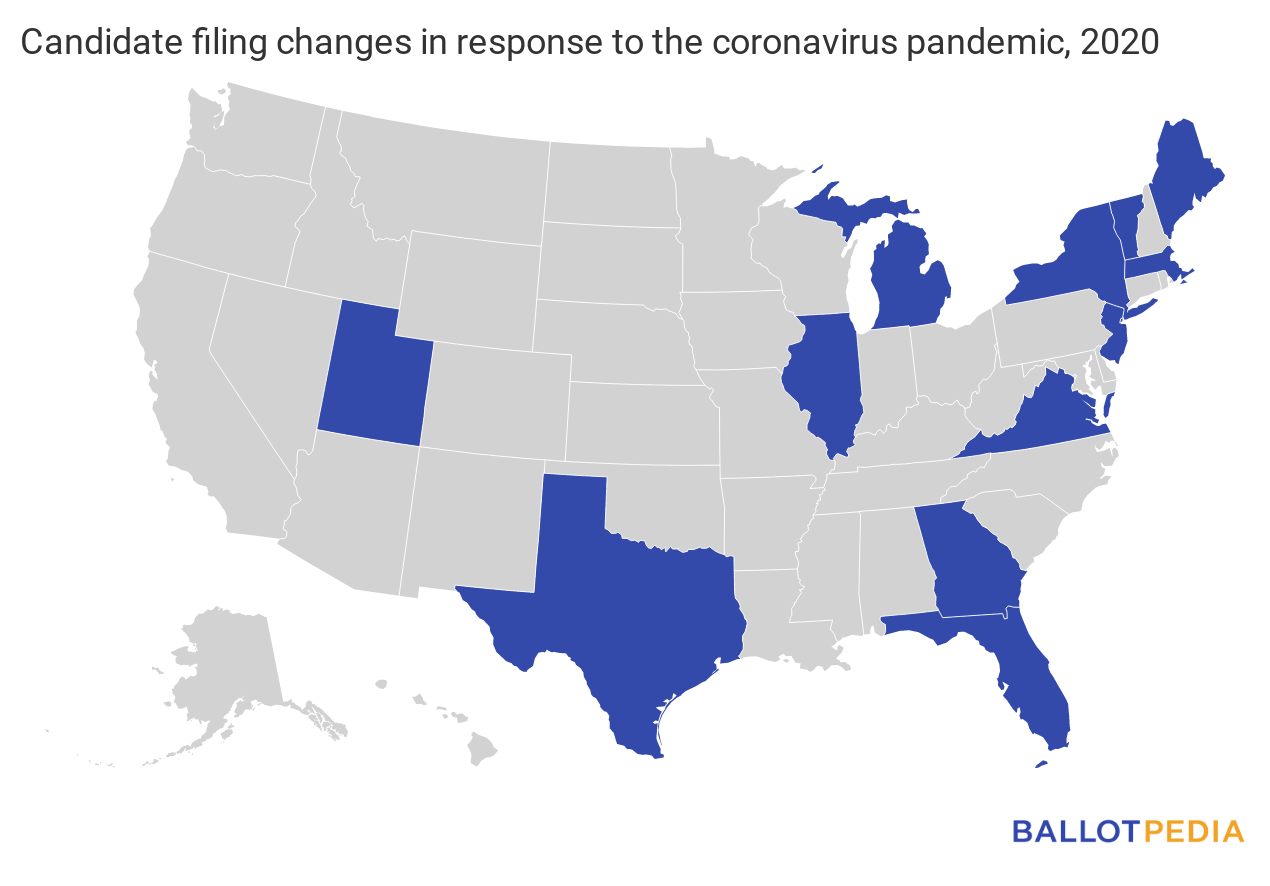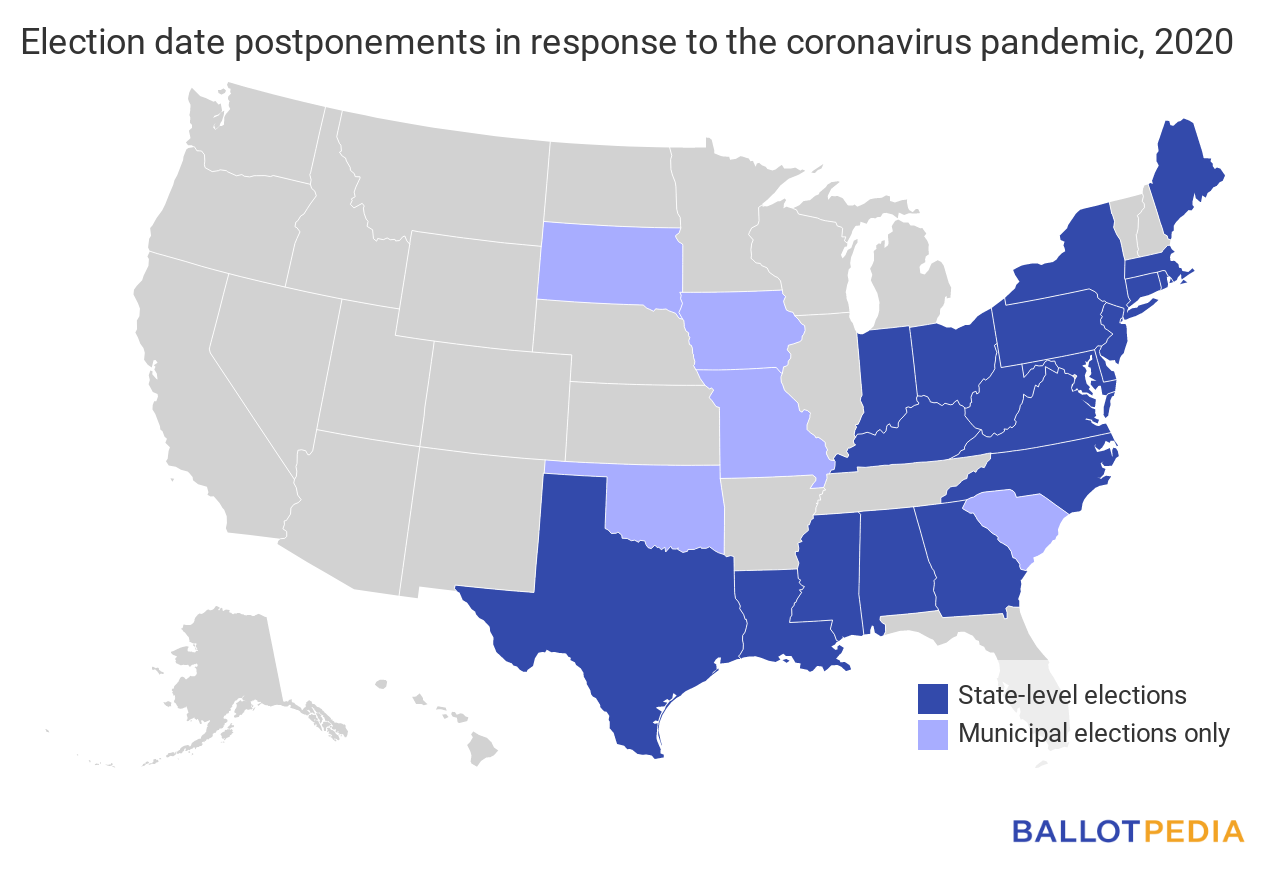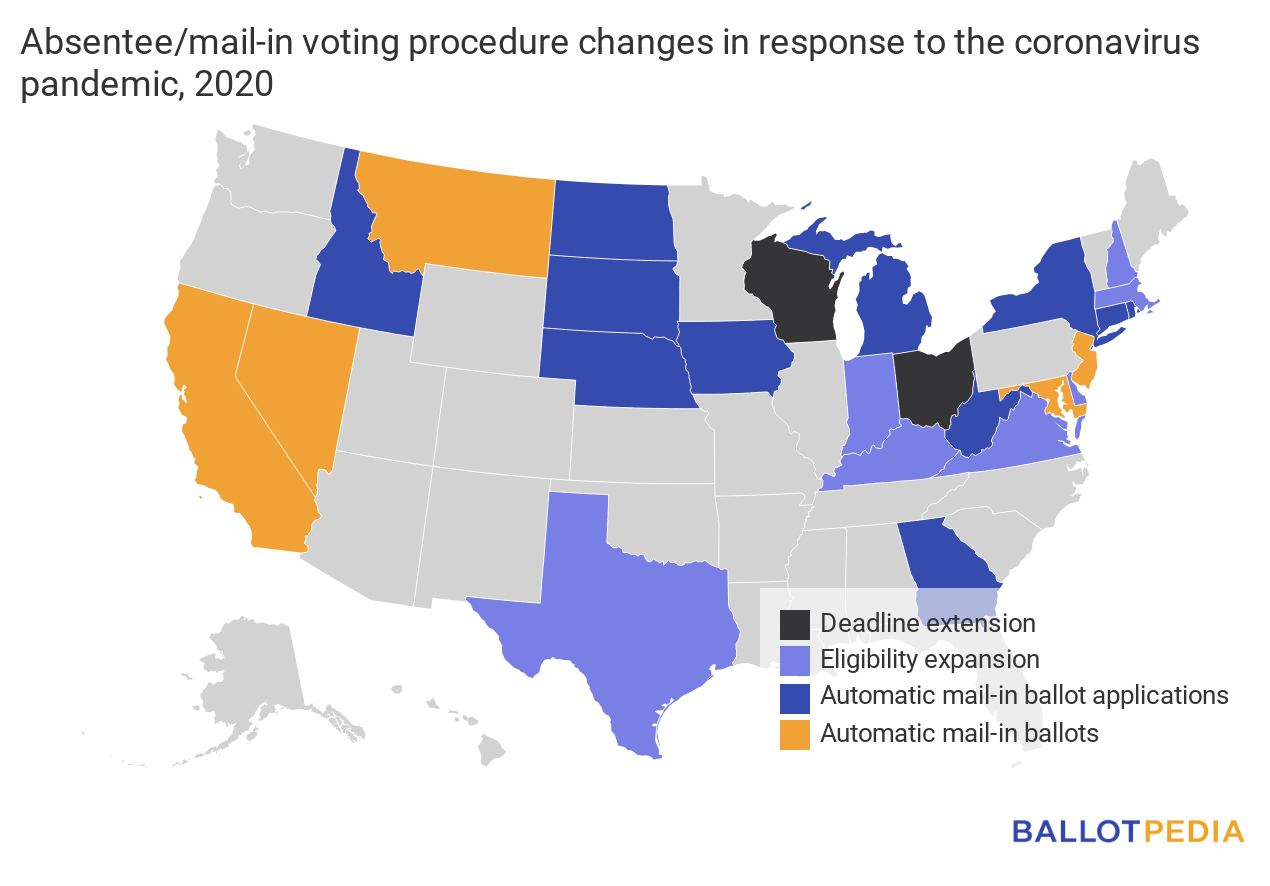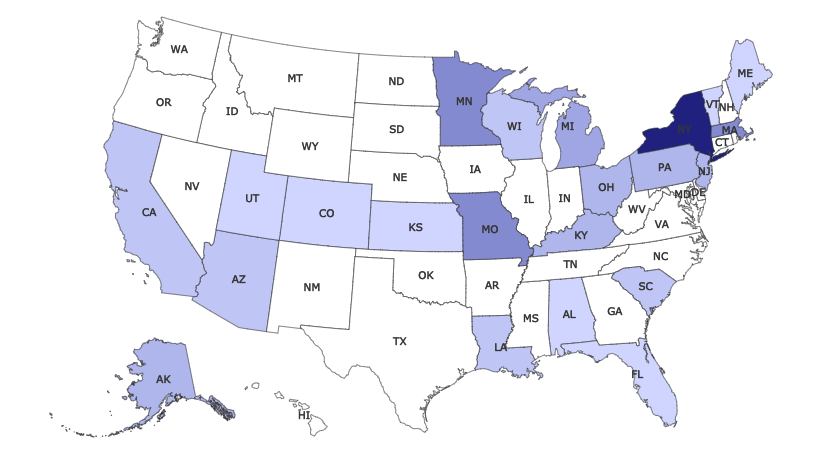States modify candidate filing procedures in response to the COVID-19 outbreak
In response to the COVID-19 outbreak, at least 12 states have modified their candidate filing procedures for certain elections. Today, we examine this topic in depth, reviewing both the permanent statutory framework for candidate ballot access and the temporary modifications made in response to the coronavirus pandemic.
Background
In order to have his or her name printed on the ballot for an elective office in any given state, a candidate must meet a variety of state-specific filing requirements and deadlines. These ballot access laws are established and enforced at the state level. A candidate must prepare to meet ballot access requirements well in advance of primary and general elections.
Broadly speaking, there are three ways by which an individual can become a ballot-qualified candidate for elective office:
- An individual can seek the nomination of a state-recognized political party. In this case, a candidate generally participates in partisan primaries. He or she may be required to collect petition signatures, pay filing fees, or both.
- An individual can run as an unaffiliated (i.e., independent) candidate. Like partisan candidates, he or she may be required to collect petition signatures, pay filing fees, or both.
- An individual can run as a write-in candidate. In states that permit write-in voting, a candidate may be required to file some paperwork in advance in order to have his or her votes tallied. These candidates are generally not subject to the same petition and filing fee requirements as partisan and unaffiliated candidates.
Modifications in response to the COVID-19 outbreak
Some of the social distancing policies implemented by state and local governments have complicated efforts by candidates to collect petition signatures in person. As a result, candidates have sought modifications to petition signature requirements, filing deadlines, and other candidate filing procedures.
At least 12 states have made such modifications. These states are shaded in blue in the map below. State-specific details are provided below the map.

- Florida: Candidates authorized to submit qualifying documents, including signed petitions, electronically.
- Georgia: Petition deadline for minor-party and unaffiliated candidates postponed to August 14, 2020.
- Illinois: Candidates for state-level office exempted from filing statements of economic interests for the duration of the governor’s disaster proclamation period and for 30 days thereafter. Unaffiliated and new-party candidates authorized to collect petition signatures electronically. Unaffiliated and new-party candidate filing deadline extended to August 7, 2020. Petition signature requirements for unaffiliated and new-party candidates reduced to 10 percent of their original numbers.
- Maine: Petition deadline for unaffiliated candidates postponed to July 1, 2020.
- Massachusetts: Candidate filing deadlines for district and county races postponed to May 5, 2020, and June 2, 2020, respectively. Candidate petition signature requirements reduced to 50 percent of their statutory requirements. Candidates authorized to collect petition signatures electronically.
- Michigan: Petition signature requirements for select primary candidates reduced to 50 percent of their original numbers. Candidate filing deadline extended from April 21, 2020, to May 8, 2020. Election officials directed to develop procedures allowing for the collection and submission of electronic petition signatures. Modifications applied only to candidates for whom there is no filing fee option (i.e., candidates for statewide and judicial office).
- Note: On May 5, the United States Court of Appeals for the Sixth Circuit ruled that the district court judge who ordered the aforementioned modifications had erred in doing so. Although the appeals court agreed that the original requirements were unconstitutional, it found that the lower court had exceeded its authority in mandating new requirements to the state. The appeals court directed the state “to select its own adjustments so as to reduce the burden on ballot access, narrow the restrictions to align with its interest, and thereby render the application of the ballot-access provisions constitutional under the circumstances.”
- New Jersey: Candidates permitted to collect petition signatures electronically and submit petitions online. Petition deadline for unaffiliated candidates for non-presidential office extended to July 7, 2020.
- New York: Petition signature requirements for primary candidates reduced and signature-gathering process suspended effective March 17, 2020.
- Texas: Petition deadline for independent candidates for non-presidential office extended to August 13, 2020.
- Utah: Candidates and/or campaigns authorized to deliver petition sheets to voters electronically. Voters permitted to return signed petition sheets electronically or by mail.
- Vermont: Candidate petition signature gathering requirements suspended for the August 2020 primary and November 2020 general elections.
- Virginia: Petition signature requirement for Republican primary candidates for the United States Senate reduced to 3,500. Petition deadline for independent candidates for non-presidential office extended to June 23, 2020.
Lawsuits
A number of these modifications have been instituted by court order. The number of lawsuits involving election administration issues in light of the COVID-19 outbreak has been increasing in recent weeks. To date, we’ve tracked 43 such lawsuits across 24 different states. Orders have been issued, or settlements have been reached, in 15 of those lawsuits.
For example, on April 17, the Massachusetts Supreme Judicial Court issued an order extending the candidate filing deadlines for district and county races to May 5 and June 2, respectively. The high court reduced candidate petition signatures requirements to 50 percent of their statutory requirements. The court also authorized candidates to collect petition signatures electronically.
Election postponements
Since our April 22 edition, we’ve tracked the following election postponement updates:
- New York: Judge Analisa Torres, of the United States District Court for the Southern District of New York, ordered the New York State Board of Elections to reinstate the Democratic presidential preference primary, which the board had previously canceled, on June 23. The state board of elections had canceled the primary after removing from the ballot all candidates who had suspended or terminated their campaigns.
To date, 20 states and one territory have postponed or canceled upcoming state-level elections. These states are shaded in dark blue on the map below. In another five states, state-level officials have modified, or have authorized the modification of, municipal election dates. These states are shaded in light blue on the map below.

Absentee/mail-in voting modifications
Since our April 22 edition, we’ve tracked the following absentee/mail-in voting modifications:
- Connecticut: Mail-in ballot applications sent automatically to all voters in the August 11, 2020, statewide primary and November 3, 2020, general election.
- Kentucky: Absentee/mail-in voting eligibility requirements suspended, allowing all voters to cast ballots by mail in the June 23, 2020, primary election.
- New York: Absentee/mail-in voting eligibility requirements suspended, allowing all voters to cast ballots by mail in the June 23, 2020, primary election. Mail-in ballot applications sent automatically to all voters in the June 23, 2020, primary.
- Oklahoma: The state supreme court struck down a requirement that absentee ballots be notarized, finding that the requirement did not qualify as an exception under a state law establishing that statements signed and dated under the penalty of perjury carry the force of an affidavit.
- Virginia: A federal court approved a partial settlement suspending the witness requirement for absentee ballots. The suspension applies to the June 23, 2020, primary election.
To date, 26 states have made modifications to their absentee/mail-in voting procedures. These modifications can be divided into five broad categories:
- Automatic mail-in ballots: Five states (California, Maryland, Montana, Nevada, and New Jersey) have opted to send mail-in ballots automatically to all eligible voters in advance of select upcoming elections to ensure that most voting takes place by mail. These states are shaded in yellow in the map below.
- Automatic mail-in ballot applications: Eleven states (Connecticut, Georgia, Idaho, Iowa, Michigan, Nebraska, New York, North Dakota, Rhode Island, South Dakota, and West Virginia) are sending mail-in ballot applications automatically to all eligible voters in advance of select upcoming elections. These states are shaded in dark blue in the map below.
- Eligibility expansions: Seven states (Delaware, Indiana, Massachusetts, New Hampshire, New York, Texas, and Virginia) have expanded absentee voting eligibility in select upcoming elections. These states are shaded in light blue in the map below.
- Deadline extensions: Two states (Ohio and Wisconsin) have extended absentee/mail-in ballot request or submission deadlines in select elections. These states are shaded in dark gray in the map below.
- Procedure changes: Two states (Oklahoma and Virginia) have made other changes to their absentee/mail-in voting procedures that do not fall into one of the four categories listed above. These states are shaded in light gray in the map below.

Legislation tracking
To date, we have tracked 92 bills that make some mention of both election policy and COVID-19. States with higher numbers of relevant bills are shaded in darker blue on the map below. States with lower numbers of relevant bills are shaded in lighter blue. In states shaded in white, we have tracked no relevant bills.
Legislation related to elections and COVID-19, 2020
Current as of May 5, 2020

Looking ahead
In light of the COVID-19 outbreak, the U.S. Department of Commerce and the U.S. Census Bureau announced on April 13 that they would ask Congress for a four-month extension of the statutory deadline for delivering redistricting-related census data to the states. If that extension is granted, the states will receive that data in July 2021 as opposed to February or March 2021.
This will have a considerable impact on the redistricting process in the states. In a recent newsletter, political pundit Jim Ellis outlined some of the complications that might result from this proposed postponement:
“First, the political leaders in New Jersey and Virginia, places that have 2021 elections and need their new state legislative lines in place well before that date, would find themselves in a difficult position. Initially, the two states would certainly have to postpone their primary elections because both nominate their general election candidates in June. Beyond that, it is possible they would have to even postpone their general elections into [2022] or run in the obsolete boundaries that were drawn back in 2011. In either case, we could expect lawsuits being launched from whichever party loses a particular electoral contest.”
“Other states would be affected, too. Many have legal deadlines in place mandating that the new redistricting maps for state legislature and the US House delegation be adopted before the legislative sessions ends. Most states recess before mid-summer, which would mean special sessions being called if the legislature is to act.”
In our May 20 issue, we will explore this issue in greater depth.

